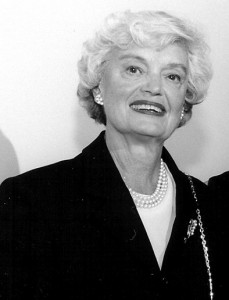d
This post is part of The Plank Center’s Legacies from Legends in PR Series that was begun in recognition of the 40th Anniversary of the Public Relations Student Society of America in 2007.
Born in Westport, N.Y.; earned a B.A., Cornell University; co-owner of Dudley-Anderson-Yutzy Public Relations; founder, Hunter Public Relations; president, NY Chapter, Public Relations Society of America (1980); trustee, Cornell University (1980-85); national president PRSA (1984); recipient of PRSA’s Fold Anvil Award (1993); current residence Walpole, NH.
When I look back on my 50-year career in public relations, starting when we still used carbon paper, mimeo machines and the U.S. mail, I am particularly gratified to note the progress made by women in the field. I well remember my first luncheon as a member of PRSA’s ew York Chapter attended by about 200 people –only 10 of whom were women. What a different picture we see today.
In the late sixties, when my sister and I decided to make an offer to buy for the firm Dudley-Anderson-Yutzy, at the time numbering about 100 on staff, we invited several men from the firm to join us. All but two turned us down, inferring they didn’t wish to work for women, and took off with their clients. We took the risk anyway and went ahead, consolidated our resources, introduced salary parity for men and women and focused our business on consumer products, especially food and beverages.
In those days we were frequently invited to make presentations to various prospective corporate clients as the token agency headed by women. We always responded, although suspecting we didn’t have a prayer of being selected. As we broadened our scope of operations, a breakthrough finally came when we won the business of sizable Midwestern city. During our orientation visit, a member of the Chamber of Commerce told us, “We never thought we’d hire an agency headed by women… But we’re glad we did.”
Several years later, after quadrupling the business, we sold the firm to a top advertising agency, with the promise we would continue to run the business. Lesson learned: After a few years, the situation changes completely. I departed, then entered the most satisfying phase of my public relations experience. With two partners I started a new firm, which has evolved into a highly successful independent company. We hired and trained young practitioners, some of whom now own the firm. Among the points emphasized: Do your homework, keep your eye on the target, never stop learning, be straightforward, don’t over promise and follow through. As a result, the business has grown in the very best way possible – through referrals.
In the early days, many in our field looked down on efforts to promote products as simply “publicity,” not worthy of the term public relations. As marketers discovered what a difference a well-conceived campaign could make, more of their dollars were committed to PR. Also, as the voice of the consumer became stronger and communications infinitely more diverse and direct, detailed information and explanations are demanded and expected. Now management cannot afford to overlook the public relations function.
My own public relations training came on the job at a time when there were few resources other than willing mentors to guide a young person. Basically, what I learned is that common sense, good judgment, curiosity, integrity and follow-through, plus mastery of basic skills, will take one a long way. Of these, I would single out integrity as being a key factor, especially today when there is such lack of trust in government, business, the media and institutions once thought to be infallible. Students today are fortunate to have experienced professors and a range of courses and resources to guide them in this field.
What makes public relations a worthy profession? I found it to be always challenging, never dull and often fun. It’s solving problems, negotiating sensitive situations, fostering understanding and nurturing trust. It’s a continuing opportunity to learn something new, broaden one’s perspective and be a catalyst for change. The field has gained a great deal of respect, a respect that can only be maintained by strict adherence to excellent and ethical performance.
